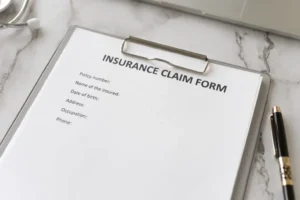Insurance is an important tool that protects individuals and companies against financial risk and uncertainty. Insurance provides protection for your home, car, business, health, or other assets. Understanding what is included in and excluded from an insurance policy may seem overwhelming. This guide will simplify the insurance concept, so that you can make confident decisions and understand the basics.
Types of Insurance Policies
There are many types of insurance, each designed to meet specific risks and needs. Your loved ones will be financially secure if you die, giving them peace of mind in difficult times. Health insurance helps you pay for medical care when you are in need. Insurance protects you against accidents, theft, or liability. Your home and possessions are protected against fire, theft, or natural disasters with homeowners’ insurance. Specialty coverages such as pet insurance and travel insurance cater to specific needs. Understanding these categories will help you determine which policies best suit your lifestyle.
What is usually included?
Many policies include standard coverage, even though the details may vary depending on your insurance provider and type. In health insurance, for example, the coverage may include doctor visits, hospitalizations, prescription medications, and even preventive care such as vaccinations or screenings. Comprehensive car insurance plans can cover theft, natural disasters, or even liability for injuries to third parties. Homeowners insurance typically covers structural damage, loss of personal property, and liability coverage if you are sued on your property. The policy will outline these inclusions and provide a basis for coverage.
Common Exclusions
While insurance policies aim to provide extensive coverage, they also come with exclusions–scenarios or factors that the insurance does not cover. Exclusions vary between policies, but they all share some examples. Some health insurance plans do not cover cosmetic procedures or elective surgery. Accidents caused by drunk driving or reckless driving are often excluded from car insurance. If you don’t have a separate policy, your homeowners insurance may not cover damages from floods or earthquakes. Understanding these exclusions will help you avoid unpleasant surprises when filing a claim.
Factors affecting Coverage
A number of factors can influence the level of coverage that you get from your insurance policy. One of the most important factors is your personal profile. This includes things like age, health, or driving history. Younger drivers are often charged higher premiums for car insurance due to the perception of a higher risk. Pre-existing conditions can also affect the coverage of your health insurance. Living in an area prone to flooding can also affect the cost of homeowner’s coverage. The scope of insurance is further defined by the policy limits and deductibles. These are the amounts you have to pay before your coverage kicks in. Knowing these factors will help you plan and better understand your insurance needs.
Understanding Policy Documents
The technical jargon used in insurance policies and the legal clauses can make it difficult to understand. It is important to familiarize yourself with the main sections of your insurance policy. The declaratory page provides an overview of coverage. It lists your policy number, your coverage limits, and your premiums. In the policy’s terms, you will find a detailed description of what coverage is covered and not covered. Special attention should be paid to riders and endorsements that modify the standard policy in order to restrict or add coverage. Ask your agent or insurance company for clarification if you have any questions.
Making Informed Decisions
It’s not about choosing the cheapest insurance plan. Instead, it’s about finding the best balance between cost and coverage. Start by assessing the risks you face and identifying the areas in which coverage is most needed. Compare quotes from various providers and focus on features and benefits, rather than price. You can also read reviews or ask for recommendations to find out about the insurer’s reliability and service. Do not forget to review your insurance policies regularly to make sure they reflect your needs and are current. Make informed decisions to maximize your insurance investment.
Conclusion
When life throws you a curveball, insurance coverage can be your best friend. Understanding the exclusions and factors of insurance policies will help you protect your family from unexpected financial burdens. Take time to educate and clarify any uncertainties. Make an informed decision. The right insurance is more than just a policy. It’s peace of mind.
FAQs
1. What is the “deductible” in insurance?
A deductible is what you have to pay before your insurance kicks in. If your health insurance is $500, for example, you will have to cover the first $500 in healthcare costs.
2. Can I negotiate the price of my insurance?
You can lower your premiums by increasing your deductible or bundling policies. If you have a good score on your credit report, ask your insurer about discounts.
3. How often should you review your insurance policy?
Reviewing your insurance policy annually, or when significant life events occur such as a marriage, childbirth, or the purchase of new property, is a smart idea.
4. Does it make sense to add riders to my insurance policy?
Riders are a great way to extend coverage and customize it for your specific needs. If you live in a high-risk area, then flood and earthquake riders are a must. You should discuss these options with your insurance provider.
5. Can I cancel my insurance policy before the end of its term?
Most insurance policies do allow cancellation. Some may charge a fee or require a certain notice period. Check your insurance policy’s conditions and terms before you make a decision.




